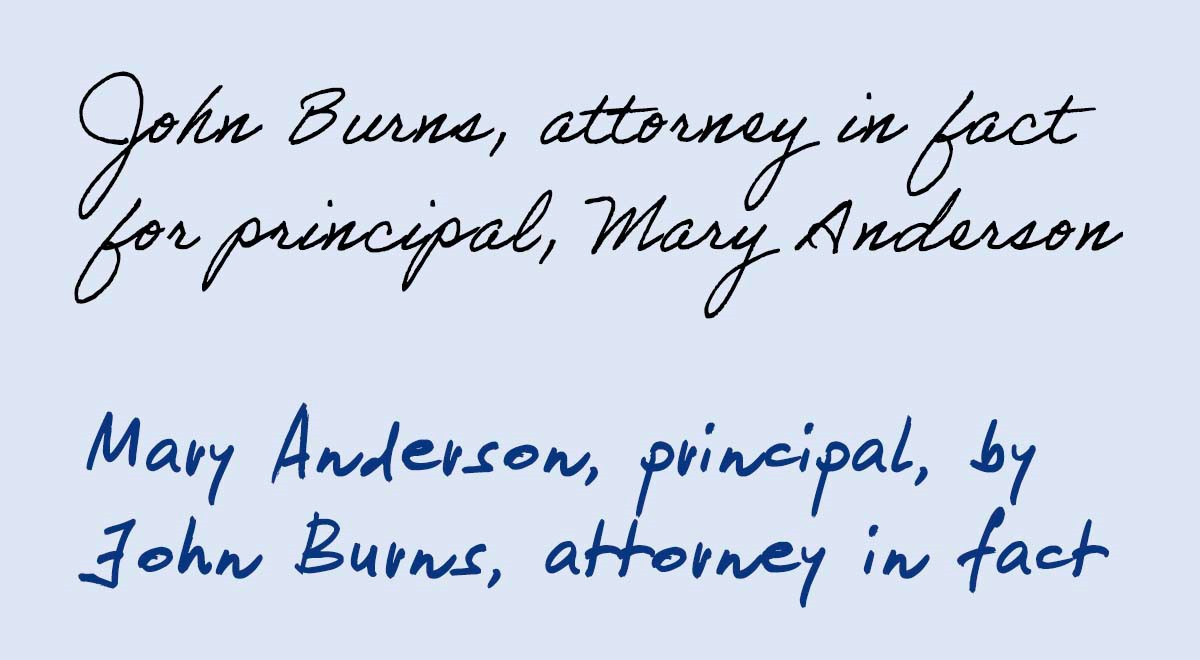Imagine you are asked to notarize a signature — and you realize the individual whose signature is on the document isn’t present. “I’ll sign it,” says the person who brought you the document. “I have power of attorney to act for them.”
Can you perform the notarization? It depends on your state law and the type of document involved, and there may be special rules to follow. Here are 5 important things to know before you notarize for a signer claiming power of attorney.
What is a power of attorney and an attorney in fact?
A power of attorney is a document authorizing someone to perform duties on behalf of another individual. A person granted power of attorney to sign documents for someone else is typically referred to as an “attorney in fact” or “agent,” and the individual represented is referred to as a “principal.”
An attorney in fact has authority to sign the principal’s name and have that signature notarized without the principal being present.
Are there special rules when notarizing a document granting power of attorney to someone?
Some states may have special requirements when notarizing a document granting power of attorney. Always be sure to follow your state rules if asked to notarize a signature on a power of attorney document.
If a California Notary is asked to notarize a signature for a document granting power of attorney, the Notary must obtain the signer’s thumbprint for their journal entry. California Notaries are also authorized to certify copies of a power of attorney document. The state’s Notary Public Handbook includes recommended certificate wording that California Notaries may use if asked to certify a copy of a power of attorney.
In Florida, if the person signing a power of attorney document is physically unable to write their name, FS 709.2202[2] permits the Notary to sign and/or initial a power of attorney on behalf of the disabled signer. The principal must direct the Notary to do so, and the signing must be done in the presence of the signer and two disinterested witnesses. The Notary must write the statement “Signature or initials affixed by the Notary pursuant to s. 709.2202(2), Florida Statutes” below each such signature or initialing.
How do I notarize the signature of someone who has power of attorney?
An attorney in fact typically signs a document with two names: the attorney in fact’s own name and the name of the principal. For example, if John Doe is acting as attorney in fact for Mary Sue, he could sign like this:
“John Doe, attorney in fact for Mary Sue, principal”
Or,
“Mary Sue, by John Doe, attorney in fact”
In this case, John Doe is the person appearing before you and signing the document, but doing so on behalf of Mary Sue. Because John Doe is the only person who is physically present and signing, you would write John Doe’s name as the signer in the appropriate parts of the certificate wording (for example, “… personally appeared before me John Doe, who acknowledged …”).

You would only have to verify the identity of the attorney in fact, not the principal. In our example, John Doe would only need to show you his ID, but would not need to show you Mary Sue’s driver’s license as well.
Some states, such as Florida, may require the Notary to use specific certificate wording when notarizing the signature of a person acting as an attorney in fact. Florida statutes provide wording for an Acknowledgment by Representative (FS 117.05[13][c]) and a Short Form Acknowledgment by Attorney in Fact (FS 695.25[5]).
When recording your Notary journal entry, the attorney in fact signs his or her own name. You should also note in the entry that the signer was acting as an attorney in fact and the name of the principal the signer represented.
Do I need to ask for proof of the attorney in fact’s authority?
Hawaii, Idaho and Montana require Notaries to verify the authority of someone signing as a representative through either your personal knowledge or by requesting written proof from the signer.
California and North Carolina do not require Notaries to verify a signer’s representative status.
In other states, if a person is signing as a representative of an absent principal, the NNA recommends asking the signer to formally state out loud in your presence that they have the authority to sign on the principal’s behalf.
Can an attorney in fact take an oath or affirmation for someone else?
Be aware that even if someone has power of attorney to sign on a principal’s behalf, taking an oath or affirmation in the name of another person is generally not permitted. If an attorney in fact requests a jurat, the attorney in fact must swear or affirm before you in his or her own name only — not the principal’s.
For example, if John Doe is signing a document that requires a jurat on behalf of Mary Sue, John Doe could take an oath stating “I, John Doe, swear the contents of this document are true,” but could not say “Mary Sue swears the contents of this document are true,” or “I swear on behalf of Mary Sue the contents of this document are true.”
What certificate do I use if someone is signing as attorney in fact?
If your state law prescribes a specific certificate for someone signing as attorney in fact, use that wording. If your state does not specify attorney-in-fact wording, then you may use the appropriate standard certificate for the notarial act. Always make sure you are using the appropriate wording required in your state or territory before proceeding.
David Thun is the Editorial Manager at the National Notary Association.
Related Articles:
A guide to notarizing for representative signers